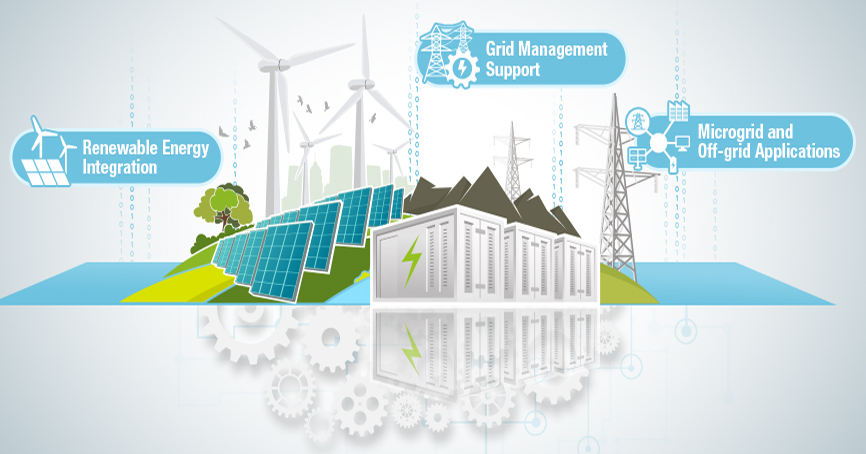Resources / Featured Topics
Why Battery Storage Is the Backbone of Future Smart Grids

Battery Energy Storage Systems (BESSs) are becoming more and more crucial in modern smart grids as the global energy transition speeds up. Smart grids rely on them to balance and stabilize their loads. The development goals of smart grids include enhancing grid resilience and stability, supporting reliable power supply in microgrids and off-grid systems, and achieving a balanced integration of renewable energy. The key to these goals lies in robust data management capabilities, involving the seamless integration of data flow and energy flow. By collecting, monitoring, analyzing, and optimizing real-time data, we can ensure the efficient operation and reliability of energy systems.
Renewable Energy Integration: Balancing Intermittency with Flexible Dispatch
The integration of renewable energy depends heavily on BESS because wind and solar power supplies are unreliable and susceptible to weather, day-night cycles, and seasonal changes. During surplus, BESS stores electricity and releases it during shortages, ensuring grid stability. A prime example of photovoltaic energy integration is in California, which houses a massive 3 GWh energy storage facility. Because of its substantial solar power generation, California often experiences energy surplus during peak daylight hours and shortages during the night or on cloudy days. By storing excess solar energy and releasing it during peak demand, this facility avoids solar curtailment and efficiently smooths out energy demand fluctuations. To achieve flexible deployment, real-time monitoring and analysis of energy flow is necessary, along with optimizing the charge-and-discharge process and ensuring efficient use of renewable energy.
Grid Management Support: Enhancing Resilience and Reliability
Modern grids face a range of challenges, including load fluctuations, equipment failures, and natural disasters. With its rapid-response backup power, BESS helps in the swift restoration of grids during emergencies, thus strengthening grid resilience. One example is Australia’s biggest battery storage project, with a capacity of 1.68 GWh, which aims to enhance the resilience of the New South Wales grid. In a matter of seconds, this storage system can respond to grid demands and deliver instant backup power to handle unforeseen equipment failures and load fluctuations. Additionally, it balances the integration of new and traditional energy sources, optimizes the distribution of power resources, and reduces peak load pressure. Data management plays a crucial role in these processes, enabling real-time monitoring and analysis of grid and battery conditions, and providing precise operational guidance and forecasts. This ensures the system operates efficiently, enhancing grid reliability by maintaining a stable power supply.
Microgrid and Off-grid Applications: Supporting Localized Energy Management
For remote areas and developing countries, electricity availability remains a major challenge. BESS offers sustainable and adaptable solutions, operating within microgrids or off-grid systems, ensuring a dependable power supply for these regions. By creating independent energy systems, BESS delivers stable and efficient power, driving socio-economic growth and boosting energy self-sufficiency. For example, the Bahariya Oasis microgrid BESS project in Egypt combines large-scale solar inverters and energy storage systems to establish a microgrid for local businesses. Given geographical limitations and insufficient infrastructure, local renewable energy must be used as the primary energy source. This system mainly uses solar power, reducing reliance on diesel generators. This provides continuous reliable energy supply while significantly lowering environmental impact. By collecting and analyzing comprehensive OT data, this project improves energy management, predicts maintenance needs, cuts costs, and prolongs equipment lifespan.
Data Management: The Intelligence Behind BESS
Data management is at the core of BESS’s efficient operation. Through the collection, analysis, and management of data, BESS monitors energy flow, battery status, and system performance in real time. Operators use this data to make precise decisions, for example, determining the best times for charging and discharging and predicting energy demand. Moreover, predictive maintenance through efficient data management enhances system maintainability, extending equipment’s life cycle and reducing failures, thereby lowering operating costs. As the Internet of Energy (IoE) and energy transition evolve further, data management will continue to play an important role in improving the efficiency and reliability of BESS operations—providing a solid foundation for the future of smart grids.
For more information, visit our Battery Energy Storage Systems (BESS) Microsite.